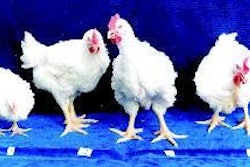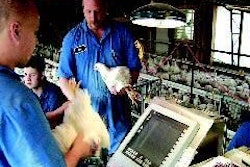Egypt is playing a dangerous game with H5N1. Government has ‘ring-fenced’ the country’s huge and valuable commercial poultry sector and will strictly control all poultry activity in towns and cities, but is maintaining its ‘hands-off’ approach in rural areas.
The full extent and impact of last year’s H5N1 pandemic on Egypt’s poultry industry only became apparent when a huge backlog of outbreaks relating to the first quarter of 2006 appeared on the OIE H5 daily update in March 2007. Between 17 February and 23 March 2006 Egypt recorded 373 outbreaks resulting in the death and destruction of over 9 million birds, including some huge farms and farm complexes which lost over half a million birds in a single stroke. And this excludes more than 350 unresolved outbreaks. In total Egypt has recorded almost 900 infected poultry farms and lost at least 30 million birds to disease or culling.
Given extent of losses it is easy to see why Egypt is determined to protect its commercial sector. It is still sustaining some big losses and for reasons unclear they are still failing to attract much publicity in the world at large.
For instance Al-Ahram Weekly reported new infections in mid-May 2007 in the Sharquiya, Quena and Qalioubiya governorates resulting in the loss of 137,000 birds in Sharquiya and similar numbers in the other two areas. By any standards these are big losses dwarfing the 160,000 turkeys lost in the United Kingdom in February an event generating several thousand news items worldwide.
Established and planned Egyptian counter-measures are as far ranging and strict as any seen elsewhere in the world. They include an existing ban on city residents rearing birds, a planned ban on trade and transport of live poultry between governorates and by 2009 no live poultry available for sale to the public who will be forced to purchase frozen chicken.
These heavy restrictions on rearing, transporting and trading in live birds will not apply to rural areas where an estimated 5 million families depend on poultry as a main source of income as well as nutrition. Abdel-Rahman Shahin official spokesman for the minister of health and population told Al-Ahram Weekly “Chickens make up about half of animal protein consumed in Egypt compared to about 26 per cent globally.”
H5N1 is endemic in Egypt’s rural backyard flocks and village owners comprise almost all 34 human cases recorded in Egypt so far. Most were young females, with a high percentage of children under 6 years of age, reflecting specific cultural and socio-economic factors surrounding rural backyard poultry keeping in Egypt.
Egypt is regularly described as the country with highest number of human H5N1 cases outside of Asia, although on a 2007 per capita basis has the highest number in the world.
The Egyptian Government is not leaving the rural population completely at the mercy of H5N1 and hopes vaccination will dampen down the disease sufficiently in rural backyard poultry to a keep a lid on the number of human infections. But the logistics of coping with village backyard poultry is one of the main reasons why government stopped monitoring the disease and culling birds in these areas. There is no reason to assume that cooperation from rural backyard poultry owners will be any better for vaccination programmes.
Egypt received public praise from WHO Director General Margaret Chan for the way it is tackling bird flu, and it has certainly slashed outbreaks in commercial poultry from almost 900 in 2006 to just a handful this year. But its policy of leaving the rural backyard sector to its own devices is a dangerous game. End result could well be a disease-free commercial poultry sector and temporary respite for city dwellers, but at expense of something much nastier in villages up and down the River Nile as more and more villagers succumb to the disease.
Wider still if Egypt continues to allow endemic bird flu in rural backyard poultry these outdoor free-range flocks will present a permanent reservoir of infection for the millions of wild migratory birds that use the Black Sea Flyway during yearly migrations between Europe/ Western Asia and West Africa.


















